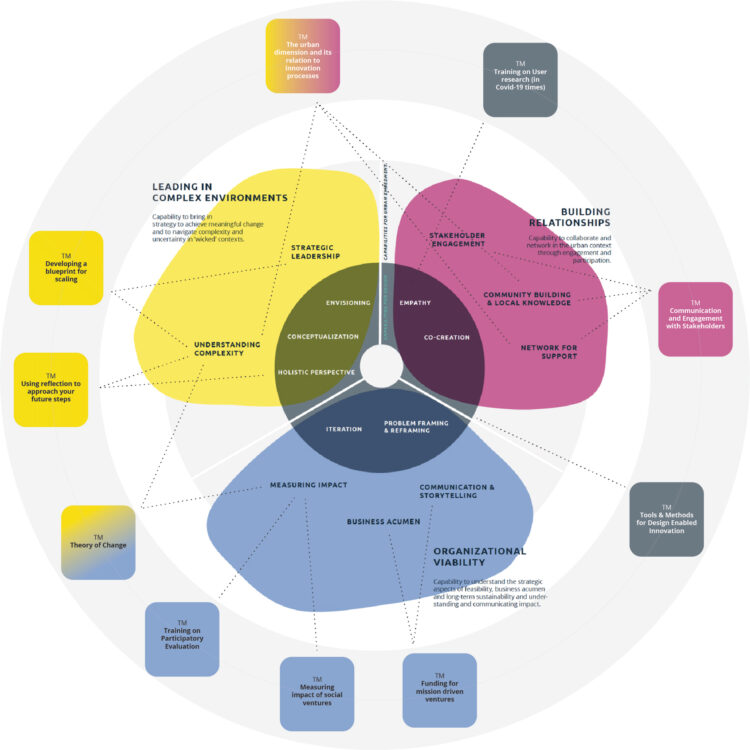Design-enabled Value Creation for a Resilient Delta
Nov 2023 - ongoing
While early research on transdisciplinary collaboration offers initial insights and methodologies for establishing common goals and bridging disciplinary gaps, little is known about the process of joint value creation in mission-driven projects and how to support it effectively. How do members of mission-driven projects deal with value in their projects, what are the effects of this for the project collaboration and outcomes, and how can design positively affect this?
Creating shared value is vital in transdisciplinary projects focused on resilience in the Greater Rotterdam region, such as empowering underprivileged groups or achieving spatial justice. Project members must anticipate future value for the environment, citizens, and various organizations (e.g., businesses, educational institutions, and government bodies), while working within existing institutional constraints. This is challenging as participants have diverse backgrounds, organizational interests, and beliefs. Additionally, differing value perspectives complicate matters. Values often remain implicit and ambiguous in project collaborations, resulting in value conflicts and uncertainties that can cause delays and suboptimal outcomes in answering pressing societal challenges such as urban inequalities.

Previously developed Design-enabled Innovation Capabilities Framework identified the emerging skills needed for urban change makers (Source: Mulder, I., & Magni, A. (2022). Design and engineering as agents of change: a capabilities framework. In E. Bohemia, L. Buck, & H. Grierson (Eds.), Proceedings of the 24th International Conference on Engineering and Product Design Education (E&PDE 2022), London South Bank University in London, UK. 8th – 9th September 2022: Disrupt, Innovate, Regenerate & Transform (E&PDE). The Design Society. https://doi.org/10.35199/EPDE.2022.92) (Quick download here)
The project believes that making joint value creation an explicit and inclusive (involving all relevant stakeholders) process will help project teams to make more impact with designing for resilience and accelerate pathways to envisioned futures. As such, this project’s aim is twofold: firstly, a comprehensive understanding of joint value creation in mission–driven projects will be developed, building upon the results of 100 transdisciplinary creative consortia that are spread across different European countries. These consortia have previously shown a variety of design skills and capabilities that facilitate successful mission-driven innovation. Secondly, a directly implementable design method/tool for optimizing joint value creation will be created. To this end, a first workshop is scheduled in April during the “Reinventing the City” conference at the AMS Institute. The workshop format is developed in collaboration with the Resilient Delta Initiative and the Delft Design for Values Institute. A diverse group will participate, including researchers, designers, engineers, developers, policymakers, government officials, entrepreneurs, activists, and citizens. The workshop aims to assist project members operating within the urban fabric to increase the sustainability, liveability, or resilience of cities by facilitating the development of clear strategies for their joint value creation processes.
Who is involved?
The Design-enabled Value Creation team’s main members include Assist. Prof. Dr. ir. Marina Bos-de Vos (TUD), Assoc. Prof. Dr. Ingrid Mulder (TUD), researcher Ir. Sterre de Jager (TUD) and PhD candidate Maurice Jansen, MSc (EUR). Throughout the project, the team will join forces with a growing network of people in understanding how to effectively support projects addressing resilience questions, and thereby contribute to realizing diverse types of resilience in different domains. Thus, further collaborating partners already include members of the Delft Design for Values Institute from 5 TUD faculties, Dr. ir. Steven Flipse & Dr. Éva Kalmár (TUD), AMS researchers involved in the Urban Living Lab program, and Dr. Amanda Brandellero (EUR).
Awarded with the Convergence Resilient Delta Kick-Starter Grant
The Resilient Delta Initiative is a part of the Convergence, a partnership between TU Delft, Erasmus University Rotterdam, and Erasmus MC. The goal of the Convergence is to create new perspectives and solutions to tackle the urgent and complex societal challenges of our time. Resilient Delta focuses on the delta regions, “which are home to more than two-thirds of the world’s largest cities and are at risk from rising sea levels owing to their geographical location.” Resilient Delta is made up of a group of interdisciplinary researchers, all of whom collaborate with societal partners to design resilience solutions in the real-world dynamics of the Rotterdam delta.
Design-enabled Value Creation for a Resilient Delta has received a €30,000 Convergence Kick-Starter Grant from Resilient Delta.
This blog is a partial repost of the article on TU Delft’s Industrial Design Engineering News.